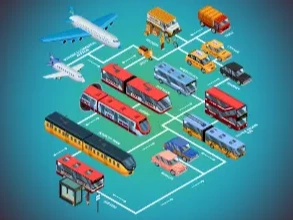Dear Colleagues,
There are two parts to this topic, ground transportation and air transportation, which are summarized below.
Currently, there are nearly 800 million ground vehicles (42% automobiles, 30% light trucks, 20% heavy-duty trucks and 8% buses) in service worldwide. They are responsible for ~ 50% of petroleum (oil) consumption and 40% of all greenhouse gas (GHG) emissions worldwide. The number of vehicles is forecasted to double by 2050. Therefore, environmental issues such as noise, emissions and fuel burn have become important for energy and environmental sustainability. The focus of this topic is the energy and environmental issues related to ground transportation. Entries or review papers are requested on technologies related to reductions in energy requirements, including reducing the vehicle mass by using high-strength low-weight materials and reducing the viscous drag by active flow control and smoothing the operational profile, as well as reducing the contact friction using special tire materials along with portable energy sources for reducing GHG emissions, such as low-carbon fuels (biofuels), lithium-ion batteries with high energy density and stability, and fuel cells. A recent push by governments worldwide towards the replacement of gasoline-consuming cars and light trucks with battery- and/or fuel-cell-operated vehicles with zero mobile emissions should also be considered by authors, including a short-term and long-term outlook. The technological challenges and opportunities for innovations in this field should be addressed if possible.
Among all the modes of transportation, travel by airplanes continues to experience the fastest growth. Currently, there are approximately 500,000 air vehicles (335,000 active general aviation aircrafts, 18,000 passenger aircrafts, 90,000 military aircrafts, 27,000 civil helicopters, and 30,000 military helicopters). They are responsible for 9% of fuel consumption and 2% of all greenhouse gas (GHG) emissions worldwide. These numbers are forecasted to double by 2050. Therefore, environmental issues such as noise, emissions and fuel burn for airplanes have become important for energy and environmental sustainability. Entries or review papers are requested on energy and environmental issues related to air transportation. Papers that deal with topics related to noise and emissions mitigation with technological solutions, including new aircraft and engine designs/technologies, alternative fuels and materials, as well as the examination of aircraft operations logistics including air-traffic management (ATM), air-to-air refueling (AAR), close formation flying (CFF), and tailored arrivals to minimize fuel burn, are requested. Papers on ground infrastructure for sustainable aviation, including the concept of ‘Sustainable Green Airport Design’, are also welcome.
Prof. Dr. Ramesh Agarwal
Dr. Massimiliano Lo Faro
Collection Editors
Please click here to find Guidelines for Submissions.
Institution: William Palm Professor of Engineering, Washington University in St. Louis, 1 Brookings Drive, St. Louis, MO 63130, USA
Interests: mechanical and aerospace engineering; energy and environment; computational fluid dynamics and computational physics (computational acoustics; computational electromagnetics; computational materials science and manufacturing; computational geo-sciences and computational combustion); fluid dynamics and heat transfer; hypersonic flow and rarefied gas dynamics; aerodynamics; ground effect aerodynamics; green aviation; turbo-machinery and pumps; microfluidics; bio-fluid mechanics; flow and flight control; chemical looping combustion; carbon capture; utilization and sequestration; wind, solar and bio-energy; climate modeling etc.
Institution: Istituto di Tecnologie Avanzate per l'Energia "Nicola Giordano" - Consiglio Nazionale delle Ricerche (ITAE-CNR), Via Salita S. Lucia Sopra Contesse 5, 98126 Messina, Italy
Interests: fuel cell; electrolyser; sensor; battery; air treatment device; protonic conductors; oxygen ion conductors; cermets; electrochemistry; mixed ionic electronic conductors

Sorry, there is no entry in this entry collection.

